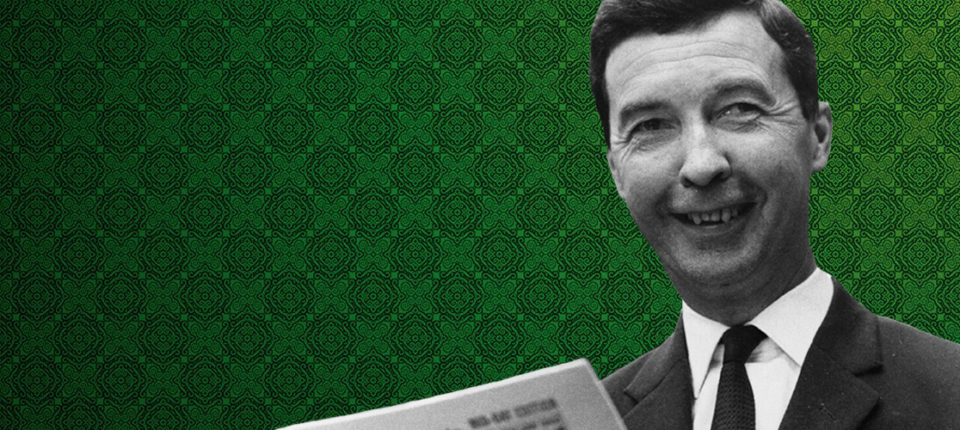Dick Francis was a master of the first line, the first paragraph, the first page. Once read, they hooked you immediately. Nothing would keep you from wanting to find out what happened next.
Take the opening of Straight (1989):
“I inherited my brother’s life. Inherited his desk, his business, his gadgets, his enemies, his horses and his mistress. I inherited my brother’s life, and it nearly killed me.”
So much packed into three sentences. First, note the rule of three: inherited…inherited…inherited. Short-long-short-boom. How did his brother die? Were his enemies responsible? What was his business? His “gadgets”? Wait, inherited his mistress? Nearly killed him? You’ve got to find out, don’t you?
A few other choice openers:
“I had told my drivers never on any account to pick up a hitchhiker, but of course one day they did, and by the time they reached my house, he was dead.” (Driving Force, 1992)
“Sadly, death at the races is not uncommon. However, three in a single afternoon was sufficiently unusual to raise more than an eyebrow.” (Under Orders, 2006)
“I intensely disliked my father’s fifth wife, but not to the point of murder.” (Hot Money, 1987)
“I was never particularly keen on my job before the day I got shot and nearly lost it, along with my life. But the .38 slug of lead that made a pepper shaker out of my intestines left me with fire in my belly in more ways than one.” (Odds Against, 1995)
“Fire in the belly” is an apt term for all of Francis’s heroes—maybe not at first, but once their sense of injustice is aroused, they are driven. Most of them are ordinary blokes with a keen morality and, once spurred, they prove to be more courageous and resourceful than they—or their enemies—had thought themselves to be. They’re often a bit damaged—physically, mentally, or both—stalwart yet sensitive men in the 30s, who come from dysfunctional families and are often single—divorced, widowed, in love with someone inappropriate (a relative, a friend’s wife) and thus unable to act on it—and if he’s married, it might be to someone with a debilitating condition that makes physical intimacy impossible. Francis never made it easy for his heroes (though sometimes he let them meet someone romantically suitable by the end of the book).
The heroes were almost always different—Francis repeated only two characters during all of his 40 books from 1962 to 2006—jockey Kit Fielding, who appeared in two books, and jockey-turned-investigator Sid Halley, who appeared in three (plus one written by Francis’s son, Felix). Halley is a true exemplar of a Francis hero, a man intelligent and principled, with a hand terribly injured in a racing accident, the sight of it enough to make new acquaintances gasp, who finds bravery and his true calling in the midst of a storm of adversity. More about him later.
The Francis heroes were often, of course, part of the horse-racing world, but not always jockeys. They were trainers, breeders, stud farm owners, stable owners, racing reporters, horse transporters, and bookmakers. They were also pilots (Flying Finish, 1966; Rat Race, 1970), actors (Smokescreen, 1972), artists (In the Frame, 1976; To the Hilt, 1996), accountants (Risk, 1977), teachers (Twice Shy, 1981), diplomats (Comeback, 1991), bankers (Banker, 1982), kidnapping experts (The Danger, 1983), wine merchants (Proof, 1984), architects (Decider, 1993), filmmakers (Wild Horses, 1994), and glass-blowers {Shattered, 2000)—but always in some fashion drawn into a mystery or crisis related to racing or horses.
Because that was where Francis’s heart was. Here, for instance, is his hero, William Derry, in Twice Shy:
“I loved the Heath in the early mornings with the manes blowing under the wide skies. My affection for horses was so deep and went back so far that I couldn’t imagine life without them. They were a friendly foreign nation living in our land, letting their human neighbors tend them and feed them, accepting them as servants as much as masters. Fast, fascinating, essentially untamed, they were my landscape, my old shoes, the place to where my heart returned.”
And here is jockey Rob Finn in Nerve (1964):
“Give me a horse and a race to ride it in, and I don’t care if I wear silks or…or…pajamas. I don’t care if anyone’s watching or not. I don’t care if I don’t earn enough money or if I break my bones, or if I have to starve to keep my weight down. All I care about is racing…racing…and winning, if I can.”
Francis knew about all of that personally. His grandfather, great-uncle, and father had all been jockeys, and Dick and his brother learned to ride before they could read. In fact, to his mother’s chagrin, his father sometimes let him skip school to ride—“What he can’t learn on the back of a horse is not worth teaching”—and Francis left school at 15 to work in stables. World War II intervened, and he became a pilot in the RAF, but as soon as that was over, he became a steeplechase trainer’s assistant and amateur jockey, then turned professional, and in 1953, became first jockey for the Queen Mother herself. For four years, he was on top of the world—he won 350 races in total and was the Champion National Hunt Jockey in 1953-54—but it is for one race in particular that he has been remembered.
In March 1956, he rode the Queen Mother’s horse, Devon Loch, in one of the world’s great races, the Grand National. He had cleared all the fences and was well ahead of the field, less than 50 yards from the finish line, the crowd roaring because it would be the first royal win in the National since 1900, when suddenly Devon Loch pricked up his ears—and collapsed, his legs spread-eagled on the ground. He got up again and trotted off, but it was way too late.
“I went to the weighing room, took off my silks and sat there with my head in my hands,” said Francis. “It was hell.” The Queen Mother was nice about it—she said, “Oh, that’s racing”—but like Francis, she lived with the disappointment the rest of her life.
What caused the collapse? Nobody knows, though there were many theories, some of them sensible—a cramp, a blood clot, a reflection—and some positively daffy—a Soviet plot, a massive fart (!). Francis himself always thought it was the unusually high volume of crowd noise.
He continued racing, but the sport had taken a toll on him: “I’ve had a fractured skull, six broken collarbones, five broken noses, no end of ribs. Well, you simply stop countin’.” After a particularly bad fall in 1957, which injured his spleen, an advisor to the Queen Mother took him aside and said, “Listen, I’m going to tell you something now. You’re at the top of the tree, you’re leading the jockey’s table, why don’t you get out now? The Queen Mother doesn’t want you to ride her novice chasers any more.”
“It was a terrible thing to say to me at the time,” said Francis. “I nearly threw myself in the Serpentine on the way back through Hyde Park. But I was 36 and I knew I wasn’t bouncing as well as I had in the past.” He retired.
He was already halfway through his autobiography The Sport of Queens (1957) and he signed on to be a racing correspondent for the Sunday Express, but he needed to find a more lucrative way to earn his living. Then his wife, Mary, said, “We’ve got two sons to educate, the car’s beginning to knock and the carpets are wearing out. You should write a novel.”
The result was Dead Cert (1962):
“The mingled smell of hot horse and cold river mist filled my nostrils. I could hear only the swish and thud of galloping hooves and the occasional sharp click of horseshoes striking against each other.”
An amateur jockey named Alan York sees his friend die in a fall and discovers a wire stretched across the course. Was it to stop the horse or kill the jockey? He digs around and uncovers a brutal extortion racket—one that very nearly costs him his own life.
All the ingredients were there: the resourceful hero called to action; the psychopathic criminal; the spare, taut, exciting prose that moved the story right along; the clear, often wry, dialogue that never rang false; the pulse-pounding action scenes.
“Fire in the belly” is an apt term for all of Francis’s heroes—maybe not at first, but once their sense of injustice is aroused, they are driven.The villains were always awful, and you often knew who they were right from the start. They were ruthless, cruel, and capable of doing whatever it took to succeed with their plans. Other times, they were immensely charming, good-looking, quite likable actually—until the mask fell and the real man was revealed.
The women, interestingly enough, were often very substantial. They were straightforward, intelligent, highly capable in their professions, and didn’t need men to tell them they were good—they knew it. They were doctors, trainers, police constables, journalists, musicians, scientists, professors. Occasionally, they were also love interests for our heroes, but they were never lesser characters in any way—they were allies and colleagues, and valuable precisely because they were so strong. It’s always been one of the reasons Francis’s novels have had great appeal to women readers—that, and those poor, sensitive, broken-but-resilient heroes, of course.
The other hallmark of a Francis thriller was always his extraordinary set pieces. His heroes went through dreadful physical and emotional trials, especially in the earlier books, where the scenes were positively arias of struggle and survival.
A jockey is hung from a hook in an abandoned stable on a freezing night, doused with buckets of cold water, and left to die or be crippled (Nerve). A man is handcuffed to a car steering wheel in the desert and left to die of heat and dehydration—but wait! He’s an actor in a movie called Man in a Car, so that’s all right…until he finds himself in the exact same situation for real from a man who has seen his movie (Smokescreen, 1972). A racing reporter, his wife polio-paralyzed in a respirator, is beaten badly, poured full of alcohol, and must rescue her by disconnecting her respirator, moving her to a van, and driving dead-drunk to what he hopes is safety, while the clock ticks on a very, very short window of time for her survival (Forfeit, 1968). A jockey passes out from carbon monoxide, due to someone’s fiddling with his engine, and wakes up to his car astride a railroad track about to be broadsided by a train going 80 miles per hour (Enquiry, 1969).
And there’s plenty more where that came from. One of my favorite paragraphs, stark in its directness and simplicity and typical of his clear, clean prose, comes from Wild Horses:
“I felt a thud as if someone had cannoned into me, a knock hard enough to send me stumbling forward onto one knee and from there overbalancing to the ground. I fell onto my right side and felt the first pain, sharp and alarming, and I understood with searing clarity that I had a knife blade in my body and that I had fallen onto its hilt, and driven it in further.”
You can’t write much better than that. In all the books, Francis was ably assisted by his wife Mary, and here’s where we might as well address the question of who did what. Francis had always credited Mary as his true partner in the books. “Mary and I worked as a team,” he told an interviewer. “I have often said that I would have been happy to have both our names on the cover. Mary’s family called me Richard due to having another Dick in the family. I am Richard, Mary was Mary, and Dick Francis was the two of us together.”
There’s never been any question that Mary was integral to the novels. She did much of the research, for one thing. For In the Frame, she learned to paint. For Flying Finish, she learned to fly a plane, wrote a book about flying, then started an air taxi service, which she ran for seven years. For Reflex, she became such an accomplished photographer that she was asked to take a picture of the Queen Mother for a book dust jacket.
When an unauthorized biography claimed that she actually did the writing, though, he put his foot down. “No. I do all the stories. I write them out in longhand. She then reads and edits them, because she can manage my handwriting.” She also discussed plot and character with him. “She’s my only editor, really.”
He often offered to put her name on the books as co-author, but she always declined. “I always say ‘we’ because I couldn’t do the books without Mary,” he said.He often offered to put her name on the books as co-author, but she always declined. “I always say ‘we’ because I couldn’t do the books without Mary,” he said. “I wish Mary would let me put ‘By Dick and Mary Francis’ on the books.” However, he said at another time, “She wouldn’t have that. She argued that it was my name that would sell the books.”
An indication of how much they collaborated, perhaps, is that after Mary died in 2000, Francis announced that he would write no more books. Six years later, though, his son Felix picked up Mary’s mantle. The book the two men produced together was Under Orders (2006), a Sid Halley novel, with Dick’s name on the cover as usual. The next year, however, with Dead Heat (2007), both names were credited as authors, Dick finally getting his way as he hadn’t with Mary. The next three books were likewise co-bylined. When Dick Francis died, Felix continued alone, the books now with a new jacket formulation: Dick Francis’s Gamble was the title of the first one in 2011, “by Felix Francis.” After four of those, the formulation changed again. In 2015, it became Front Runner: A Dick Francis Novel by Felix Francis. And so it has remained through the latest book in 2018, Crisis.
What do I think of the Dick and Mary question? I think it makes no difference to me at all who did what. We have these books, and they are magnificent, and that’s all that matters. As for Felix, he’s done his father proud. “I remember growing up in a house where breakfast talk would be about the damage a bullet might do to a man’s guts rather than the more mundane topics of everyday life,” he’s said, and it shows. If you’re a Dick Francis fan, you’ll enjoy the books with Felix’s name on the cover as well.
Dick Francis died in 2010 at the age of 89, on Grand Cayman, where they’d moved for Mary’s health. Over his career, Francis won the Edgar for best novel three separate times in three different decades, for Forfeit (1970), Whip Hand (1981), and Come to Grief (1996), and in 1996 also won the MWA’s Grand Master Award. Britain’s Crime Writers Association awarded him its Gold Dagger Award in 1979 and the Cartier Diamond Dagger for lifetime achievement in 1989. He was also granted the Malice Domestic award for lifetime achievement in 2000, the same year he was awarded a CBE, Commander of the Order of the British Empire by the Queen. He’d already won an OBE in 1983, and was a Fellow of the Royal Society of Literature.
__________________________________
The Essential Francis
__________________________________
With any prolific author, readers are likely to have their own particular favorites, which may not be the same as someone else’s. Your list is likely to be just as good as mine—but here are the ones I recommend. 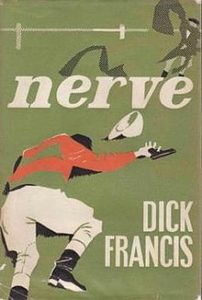
Nerve (1964)
“Art Mathews shot himself, loudly and messily, in the center of the parade ring of Dunstable races….He hadn’t even shut his eyes, and they were still open as he fell forward to the ground, his face hitting the grass with an audible thud and his helmet rolling off….Heads turned searchingly and the busy buzz and hum of conversation from the three-deep railside racegoers grew hushed and finally silent as they took in the appalling, unbelievable, indisputable fact that what remained of Art Mathews lay face downward on the bright green turf.”
So begins Dick Francis’s second novel, and he’s already clearly in command. What reader wouldn’t want to find out why Mathews did it? The speaker, as in all Francis novels, is the first-person narrator and hero. Here, he is a steeplechase jockey named Rob Finn, who’s been riding for two years and has begun to sense something wrong in the racing world: “Between trainers and jockeys there seemed to be an all-round edginess, sudden outbursts of rancor and an ebbing and flowing undercurrent of resentment and mistrust.”
Jockeys are being promoted, then demoted, often because of rumors of lack of effort or simply losing their nerve to ride hard. Finn benefits from some of the other riders’ demotions for a while, but when he, too, falls victim and begins to lose jobs, he fights back…leading to that excruciating scene in the abandoned stable, strung up by his hands to a harness hook in the freezing night, soaking wet and blindfolded, and left to die of the cold. The depiction of how he manages to extricate himself is one of Francis’s finest setpieces—as is the unfolding of Finn’s subsequent plan to turn the tables on his tormentor. Great stuff.
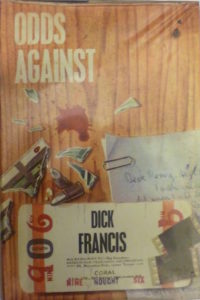
Odds Against (1965)
The first Sid Halley novel. Halley’s accident has left him with a crippled hand and a broken heart—“I’d lost what I wanted most in the world and lost it irrevocably. I’d found nothing else to want.”— and even though he’d gotten a job with a private eye agency, he really doesn’t care about anything. Until, that is, he is humiliated at a dinner party by a crooked speculator named Howard Kraye, a man with “a neat enclosed face like a mask, with perhaps something rotten underneath. You could almost smell it across the dinner table.”
It turns out that the episode has been set up by Halley’s father-in-law, who thinks Kraye is trying to get his hands on a racecourse in underhanded ways, and is hoping to prod Halley into investigating. It works, but neither of them are prepared for Kraye’s subsequent campaign of intimidation, blackmail, sabotage, and murder. It is only when Halley is held prisoner at the racecourse with an overheated boiler about to explode around him that he understands the man’s true depravity.
Halley emerges from Odds Against as Francis’s most beloved character, not least for the relationship he develops with a woman named Zanna Martin, one of Francis’s best women characters. Martin is herself disfigured, her face injured in a freak accident, and it is she who teaches Sid how to deal with the stares and rudeness of others towards his own injury. It’s not a romance, exactly, but it’s enormously affecting.
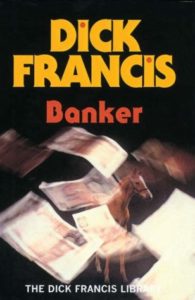
Banker (1982)
“How, I wondered, did anyone ever recover from the murder of someone one knew well and loved? How did one deal with the anger? Come to terms with the urge to revenge?”
Banker starts spectacularly when a respected banker walks out of his office and steps fully clothed into an ornamental fountain because, he tells one of his employees trying to coax him out, “They don’t like water.” Who? “Those people with white faces.”
The employee is a young investment banker named Tim Ekaterin, and he is about to find himself embroiled in a monstrous plot revolving around a fine racehorse named Sandcastle. It’s a slow-burn of a book, but the elements start piling up: attacks, deaths, a forbidden romance, and at the end of it all, an unspeakable horror that hits the reader with genuine force.
Late in the book, Ekaterin tells a colleague, “Nothing that has happened so far in my life has made me fear I might die. I think…I know it sounds silly…I am unconvinced of my own mortality.”
All that’s about to change.
Banker also features not one, but three, strong women characters: his boss’s wife, Judith, with whom young Tim falls in love; Pen Warren, an extremely able pharmacist who provides him with some crucial evidence; and Ursula Young, a bloodstock agent who is “50, tough, good-looking, dogmatic, and inclined to treat [him] as a child.” They are all wonderful.
__________________________________
FILM & TV BONUS
__________________________________
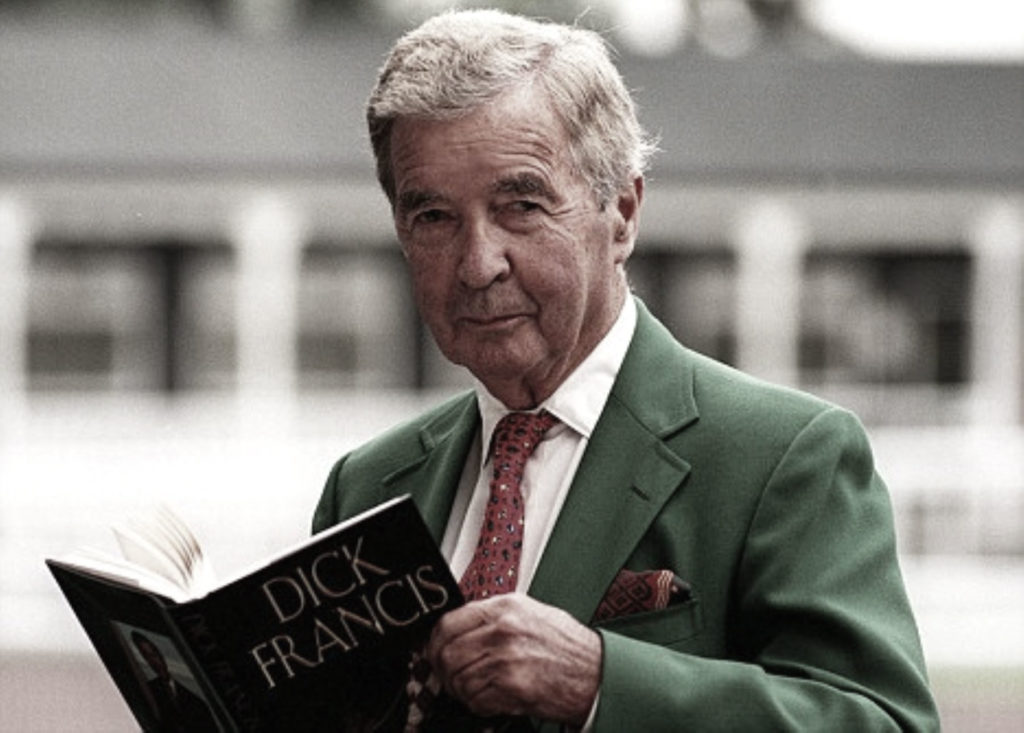
Only one Dick Francis novel was ever made into a movie: Dead Cert in 1974, directed by Tony Richardson (and featuring Judi Dench!). Of more note are the two television series that were done, 1978’s The Racing Game, six episodes featuring Sid Halley. The first was Odds Against, the others were created for the series. Mike Gwilym starred as Halley, and he was so good, Francis wrote the second Halley novel just for him.
In 1989 came The Dick Francis Mysteries, which were adaptations of Blood Sport, In the Frame, and Twice Shy, all starring Ian McShane as David Cleveland, an investigator from Francis’s Slayride. Both series were shown on PBS, where I happily watched them, and provided a major impetus to Francis’s sales in the United States. Both are excellent and available on DVD.
__________________________________
HIGHBROW BONUS
__________________________________
John Leonard, The New York Times:
“Not to read Dick Francis because you don’t like horses is like not reading Dostoyevsky because you don’t like God.”
Philip Larkin, the English poet called Britain’s greatest post-war writer (he was also offered the position of Poet Laureate, but declined) (he wasn’t much of a people person):
“[I admire the] absolute sureness of his settings, the freshness of his characters, the terrifying climaxes of violence, the literate jauntiness of style, the unfailing intelligent compassion.”
C.P. Snow, British statesman, physicist, life peer, and author. One of his most famous quotes is, “Civilization is hideously fragile [and] there’s not much between us and the horrors underneath, just about a coat of varnish.” Francis’s heroes would surely empathize.
“Dick Francis is a writer with qualities and gifts which few novelists begin to possess.”
__________________________________
UP-CLOSE-AND-PERSONAL BONUS
__________________________________
I had the pleasure of being with Francis on three or four occasions when he came to New York for promotion—Putnam published him from 1980 on. My copies of his books are filled with cheery inscriptions of “Hi, Neil!” and there was one glorious night with him and Mary and my boss at the Rainbow Room, the band playing, the wine flowing. We never talked about anything memorable, but he was very fond of corny jokes, often repeating the same ones from year to year. I tried to remember one for this piece, but couldn’t, and then, while re-reading Odds Against, I came across this exchange among Sid and two colleagues:
“You know why Sid’s best friends won’t tell him?” said Chico.
“Why?” said Dolly, seriously.
“He suffers from halley-tosis.”
“Oh God,” said Dolly. “Take him away, someone.”
Now, that is a Dick Francis joke.

